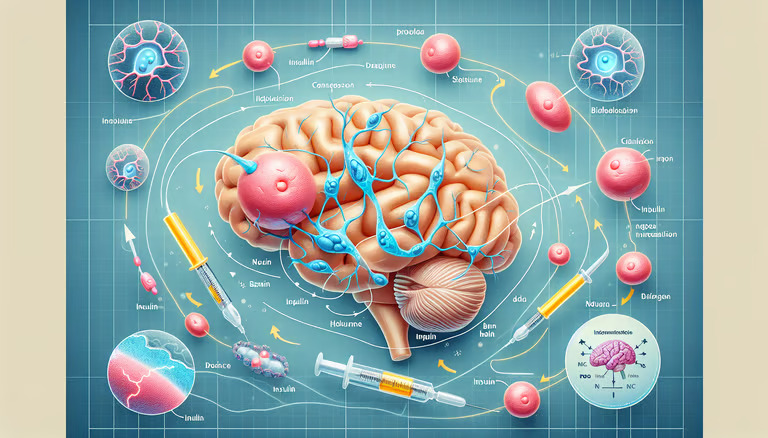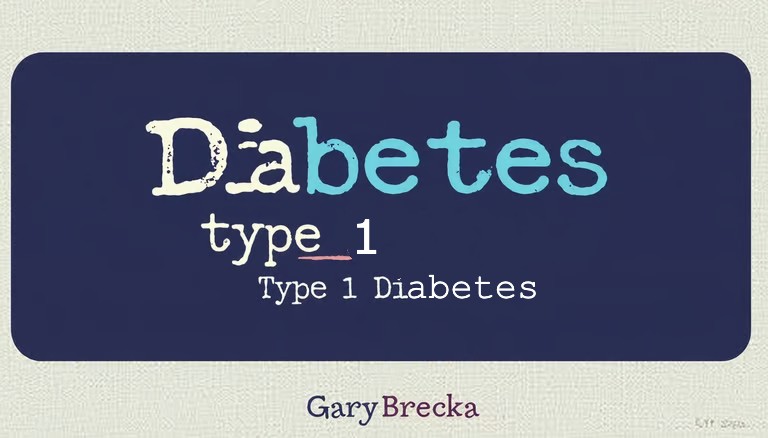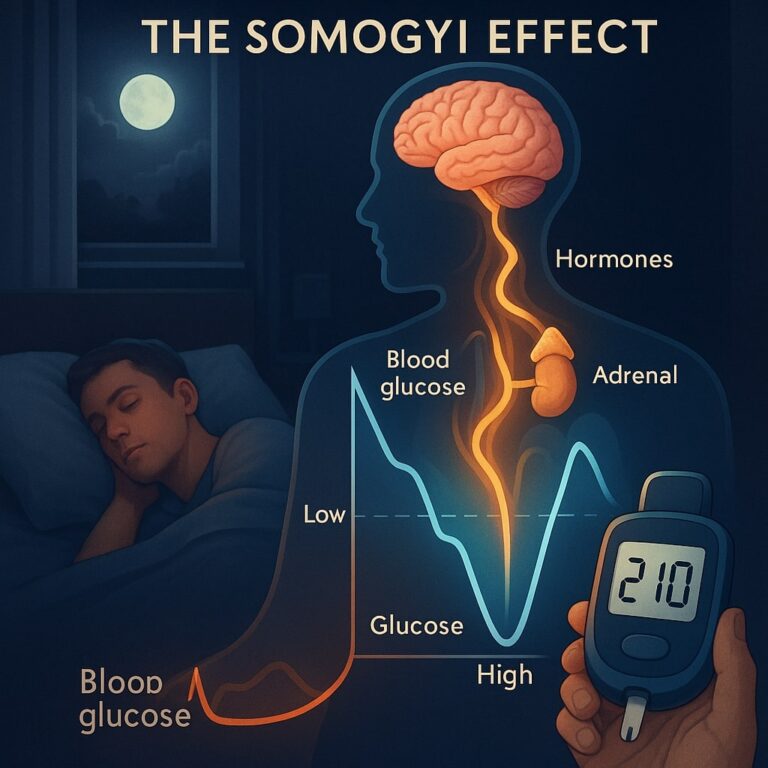Neuroprotective Effects of Insulin: What You Need to Know
Have a look at the neuroprotective effects of insulin! Uncover its role in type 3 diabetes and Alzheimer’s.
Grasping Type 3 Diabetes
Type 3 Diabetes isn’t buzzword bingo—it’s a concept linking Alzheimer’s with diabetes, especially when it comes to how insulin affects the brain and keeps it ticking.
Connection to Alzheimer’s
Alzheimer’s, that sneaky brain burglar, is often found hanging out with type 2 diabetes more than you’d like. Folks with diabetes seem to get Alzheimer’s at twice the rate of those without it (PMC). This has some brainiacs calling Alzheimer’s “type 3 diabetes”, considering the common ground they share like insulin resistance and monkeyed glucose processing in the noggin.
Importance of Insulin in Type 3 Diabetes
Insulin isn’t just the glucose traffic cop; it’s a big kahuna for brain power and protection. It’s involved in how we think, remember, and basically maintain brain wellness. Think of insulin as the ultimate brain coach, helping nerve cells grow, play well together, and stay fit, which is vital from cradle to cane.
Everyone’s buzzing about insulin’s heroic side in type 3 diabetes. Beyond managing glucose, it swings hard for team ‘healthy nerve cells’, adjusting glycogen storage and nudging neurotransmitters to keep the brain’s vibes right. Keeping those blood sugar levels just right, around 6–9 mmol/L, is key for insulin to save the day and fend off neuron nightmares.
The many hats insulin wears in the brain make it a hero in the battle against Alzheimer’s. dive deeper into these topics with our handy guides on alzheimer’s prevention strategies and managing alzheimer’s with diabetes. Also don’t miss the scoop on the alzheimer’s and diabetes connection and the unsung powers in neuroprotective effects of insulin.
Neuroprotective Effects of Insulin
Guess what? Insulin isn’t just about keeping sugar levels in check. There’s a whole other side to it that helps your brain work like a well-oiled machine! If you’re diving into the connection between type 3 diabetes and Alzheimer’s disease, this section’s right up your alley. Dive on in to see how insulin might be the unsung hero for your brain’s well-being.
Insulin and Neurotransmitters
Think of insulin as one of your brain’s best friends. It helps keep the balance of neurotransmitters, those handy little messengers that keep your brain ticking smoothly. For one thing, insulin can help keep the peace between glutamate and GABA. It lowers glutamate–which sounds great since too much of it can barbecue your neurons–and raises GABA, a calming influence in the brain world. Who knew insulin moonlights as a bouncer for your brain?
Getting a grip on insulin’s role in all this could help in managing Alzheimer’s with diabetes. By ensuring insulin levels are sussed out properly, it can keep neurotransmitter levels exactly where they need to be. The result? Neuroprotection and brain power to the max.
| Neurotransmitter | Effect of Insulin |
|---|---|
| Glutamate | Tone it down |
| GABA | Pump it up |
Regulation of Glycogen Synthesis
Insulin also gets up to mischief in glycogen synthesis in your brain. Glycogen is like your brain’s energy stash, ready to fuel operations when times are tough, or glucose is scarce. With insulin’s help, brain glycogen stores rise, prepping neurons to keep the lights on even when energy’s lacking (PubMed Central).
Extra glycogen in the brain is a game-changer, especially for those grappling with type 3 diabetes. It could potentially stave off some symptoms linked with Alzheimer’s by keeping energy levels up and neurons firing happily away.
| Benefit of Glycogen Synthesis | Effect of Insulin |
|---|---|
| Neuronal Energy Reserve | Boost those glycogen stores |
| Sustains Neurotransmission | Keeps glutamatergic circuits humming during hypoglycemia |
| Enhances Neuronal Survival | Ensures brains keep kicking during energy slumps |
Grasping insulin’s impact on neurotransmitters and glycogen shines a light on its brain-boosting potential with neuroprotective effects on insulin. Keeping insulin levels on a tight leash might just be the key to supporting brain health. Curious about preventing Alzheimer’s? Our insights might nudge future alzheimer’s prevention strategies just right. For a deeper look at how insulin swaps high-fives with brain health, wander over to our piece on insulin and brain health.
Impact of Insulin on Neuroprotection
Insulin isn’t just about blood sugar; it plays hero roles in the brain too. It steps in to guard brain cells, especially useful in something called type 3 diabetes, which is a fancy term for Alzheimer’s. Let’s see how it helps keeps those brain cells kicking.
Neuronal Necrosis: The Early Exit
Ever had your laptop crash mid-work? Well, that’s kind of what happens when neurons give up early. They stop way too soon and cause major brain drama. But insulin comes to the rescue. It jumps in through different pathways to get those neurons back on track. A big one is the protein kinase C (PKC) gig, which keeps the cell party alive and stops them from self-destructing (PubMed Central).
Then there’s the PI3-K/Akt pathway. It’s like the power grids of the brain, keeping everything running smoothly. With this pathway, insulin helps keep our memory and how we think in tip-top shape (PMC).
On top of that, insulin plays bouncer at the mitochondria club, blocking troublemaker cytochrome c from causing a ruckus that leads to cell death. Insulin is like the VIP guardian of our neurons (PubMed Central).
Neuronal Apoptosis: Self-Destruct Control
Programmed cell death, or apoptosis, is like a well-planned retirement for cells, but things go haywire when they retire too soon, and that’s how neurodegenerative diseases creep in. Enter insulin, which acts like a super-vitamin for the brain, keeping neurons spry and thriving (source).
Neuroprotective effects of insulin also keeps the brain’s growth and renewal department active, helping to build neurites—those tiny feelers critical for keeping the brain nimble and smart.
Mix in the PI3-K/Akt pathway again, and insulin transforms into a super-guide, ensuring neuron continuity by slowing down harmful processes while nurturing brain cheer (source).
| Neuroprotective Pathways | What They Do | References |
|---|---|---|
| Protein Kinase C (PKC) pathway | Keeps cells alive and blocks their early demise | PubMed Central |
| PI3-K/Akt pathway | Powers cell survival, thinking, and good memory vibes | source |
| Blocks cytochrome c | Stops unwanted cell shutdowns | source |
Grasping how insulin shields the brain is a big step in tackling type 3 diabetes. Dive deeper into insulin’s good deeds with our insulin and brain health section. If Alzheimer’s tags along with diabetes, check out our managing Alzheimer’s with diabetes guide for tips.
Therapeutic Approaches
Insulin Therapy for Diabetes
Insulin therapy is like the backbone for diabetes care, especially for those with type 1 diabetes and sometimes for type 2 folks too. It’s all about keeping blood sugar in check, steering clear of nasty complications that can pop up with diabetes. Basically, insulin pretends to be the body’s natural hormone that helps get that sugar out of the blood and into cells where it belongs. That’s a big win for your health.
Not all insulin is made the same – here’s the rundown:
- Rapid-acting insulin: Kicks in real fast and wraps up in a few hours.
- Short-acting insulin: Needs about 30 minutes to get going, sticks around for 3-6 hours.
- Intermediate-acting insulin: Takes its time, about 2-4 hours to start, but stays longer, up to 18 hours.
- Long-acting insulin: This one’s in it for the long haul, taking a few hours to get busy but lasting up to a whole day.
| Type of Insulin | Get Going Time | How Long It Lasts |
|---|---|---|
| Rapid-acting | 15 minutes | 3-5 hours |
| Short-acting | 30 minutes | 6-8 hours |
| Intermediate-acting | 1-2 hours | 12-18 hours |
| Long-acting | 1-2 hours | 20-24 hours |
Treatments for Type 3 Diabetes
The chatter about “type 3 diabetes” ties type 2 diabetes mellitus (T2DM) to Alzheimer’s disease (AD). Alzheimer’s seems to be popping up more in folks with diabetes, like a pesky sidekick. So, treatments are targeting both, aiming to double-team these health issues.
Scientists are eyeing several treatments for this type 3 thing, zeroing in on brain-boosting effects of certain goodies:
- Epicatechin: This one’s a brain helper from cocoa. It’s been linked to sharper thinking both in lab animals and humans. It crosses into the brain, perks up blood flow, kickstarts new brain cells, and changes neuron structures in learning zones.
- Cocoa Flavanols: Good old cocoa does more than satisfy your craving. It boosts brain function, especially in tasks where you’ve got to count backwards. It also fights off brain fog and improves mood.
| Treatment | Source | Brain Perks |
|---|---|---|
| Epicatechin | Cocoa/Chocolate | Boosts cognition, improves brain blood flow, fosters new brain cell growth |
| Cocoa Flavanols | Cocoa/Chocolate | Lifts cognitive task performance, beats mental tiredness, ups mood |
With these neuroprotective effects of insulin and promising treatment options, the research world is buzzing with activity. Check out our article about insulin’s effect on the brain. There’s also a handy guide for tackling Alzheimer’s when diabetes is in the mix: managing Alzheimer’s with diabetes.
Image Credit







Leave a Reply